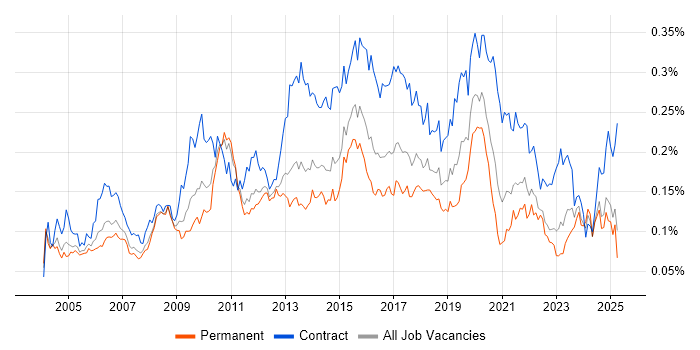Logical Data Model
UK > UK excluding London
The table below provides summary statistics and salary benchmarking for jobs advertised in the UK excluding London requiring Logical Data Model skills. It covers permanent job vacancies from the 6 months leading up to 31 December 2025, with comparisons to the same periods in the previous two years.
| 6 months to 31 Dec 2025 |
Same period 2024 | Same period 2023 | |
|---|---|---|---|
| Rank | 464 | 497 | 503 |
| Rank change year-on-year | +33 | +6 | +221 |
| Permanent jobs citing Logical Data Model | 51 | 70 | 38 |
| As % of all permanent jobs in the UK excluding London | 0.12% | 0.19% | 0.12% |
| As % of the Processes & Methodologies category | 0.15% | 0.21% | 0.14% |
| Number of salaries quoted | 24 | 29 | 26 |
| 10th Percentile | £50,250 | £49,639 | - |
| 25th Percentile | £53,750 | £56,809 | £56,809 |
| Median annual salary (50th Percentile) | £62,500 | £61,206 | £75,000 |
| Median % change year-on-year | +2.11% | -18.39% | +25.00% |
| 75th Percentile | £69,688 | £76,612 | £80,000 |
| 90th Percentile | £78,375 | £97,500 | £111,250 |
| UK median annual salary | £75,000 | £63,500 | £72,500 |
| % change year-on-year | +18.11% | -12.41% | +11.54% |
All Process & Methodology Skills
UK excluding London
Logical Data Model falls under the Processes and Methodologies category. For comparison with the information above, the following table provides summary statistics for all permanent job vacancies requiring process or methodology skills in the UK excluding London.
| Permanent vacancies with a requirement for process or methodology skills | 33,444 | 33,009 | 27,736 |
| As % of all permanent jobs advertised in the UK excluding London | 79.71% | 88.20% | 90.56% |
| Number of salaries quoted | 19,110 | 15,194 | 20,646 |
| 10th Percentile | £27,707 | £31,250 | £28,500 |
| 25th Percentile | £32,760 | £41,250 | £38,500 |
| Median annual salary (50th Percentile) | £50,000 | £55,000 | £52,500 |
| Median % change year-on-year | -9.09% | +4.76% | -4.34% |
| 75th Percentile | £65,000 | £70,000 | £67,500 |
| 90th Percentile | £80,000 | £83,750 | £80,435 |
| UK median annual salary | £55,000 | £60,000 | £60,000 |
| % change year-on-year | -8.33% | - | -4.00% |
Logical Data Model
Job Vacancy Trend in the UK excluding London
Historical trend showing the proportion of permanent IT job postings citing Logical Data Model relative to all permanent IT jobs advertised in the UK excluding London.

Logical Data Model
Salary Trend in the UK excluding London
Salary distribution trend for jobs in the UK excluding London citing Logical Data Model.

Logical Data Model
Salary Histogram in the UK excluding London
Salary distribution for jobs citing Logical Data Model in the UK excluding London over the 6 months to 31 December 2025.
Logical Data Model
Job Locations in the UK excluding London
The table below looks at the demand and provides a guide to the median salaries quoted in IT jobs citing Logical Data Model within the UK excluding London region over the 6 months to 31 December 2025. The 'Rank Change' column provides an indication of the change in demand within each location based on the same 6 month period last year.
| Location | Rank Change on Same Period Last Year |
Matching Permanent IT Job Ads |
Median Salary Past 6 Months |
Median Salary % Change on Same Period Last Year |
Live Jobs |
|---|---|---|---|---|---|
| North of England | +9 | 21 | £62,500 | +2.11% | 17 |
| Scotland | +21 | 16 | - | - | 2 |
| Yorkshire | +2 | 15 | £61,250 | +0.07% | 7 |
| Midlands | +24 | 9 | £62,500 | +4.17% | 12 |
| West Midlands | +26 | 6 | £60,000 | - | 5 |
| North West | +23 | 6 | £62,500 | +2.11% | 9 |
| South East | +14 | 5 | £63,500 | -9.29% | 26 |
| East Midlands | -6 | 3 | £75,000 | - | 6 |
| Logical Data Model UK |
|||||
Logical Data Model
Co-Occurring Skills & Capabilities in the UK excluding London by Category
The following tables expand on the one above by listing co-occurrences grouped by category. They cover the same employment type, locality and period, with up to 20 co-occurrences shown in each category:
